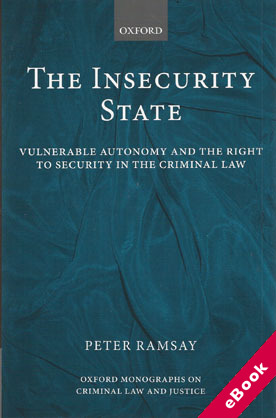
The device(s) you use to access the eBook content must be authorized with an Adobe ID before you download the product otherwise it will fail to register correctly.
For further information see https://www.wildy.com/ebook-formats
Once the order is confirmed an automated e-mail will be sent to you to allow you to download the eBook.
All eBooks are supplied firm sale and cannot be returned. If you believe there is a fault with your eBook then contact us on ebooks@wildy.com and we will help in resolving the issue. This does not affect your statutory rights.
For more than a decade, broad and vaguely defined new offences have been enacted in many areas of the criminal law, such as terrorism, money-laundering, fraud, sex offences and anti-social behaviour.
These have expanded police powers and prosecutorial discretion with little regard for the rule of law. Most theorists have explained the gap between legislative policy and the liberal principles of criminal law theory as the result of 'penal populism': politicians have sacrificed sound normative principles in an opportunistic appeal to an angry and fearful electorate.
The Insecurity State, by contrast, argues that this so-called 'populism' in the criminal law can claim some normative principles of its own. It identifies these principles through an analysis of the iconic anti-social behaviour order (ASBO), the flagship of recent British criminal justice policy.
Demonstrating that the controversial orders impose a liability on those who fail to reassure others about their future security, he traces the justification of this liability through the conditional character of citizenship in New Labour policy to an underlying concept of 'vulnerable autonomy' that the ASBO serves to protect.
The book argues that the vulnerability of individual autonomy is an idea deeply embedded in the political theories that have most influenced British and American political life in recent decades. He shows that the ASBO is the archetype of a wide range of other recently enacted criminal offences in the UK and USA that are justified by the same normative structure.
Finally it investigates the paradoxical implications of institutionalising the vulnerability of citizens in the terms of the substantive criminal law. In so doing, the book identifies a weakening of political authority at the heart of contemporary security laws.